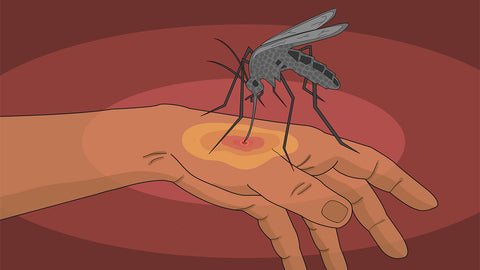By Nancy Corrales
Illustration By Lucy Aaron
Why is the Zika vaccine a major concern? Because Zika has officially entered the United States after spreading throughout North, South, Central America and several islands in the Pacific over the past year. Therefore, with no vaccine, many U.S. citizens fear the virus will reach their hometowns. Florida Governor Rick Scott has announced that the Florida Department of Health is currently investigating a new case of Zika. According to officials, the case is not travel-related. Making it likely the individual contracted the virus locally.
The Centers for Disease Control and Prevention has issued a travel warning for pregnant women headed to Wynwood, in north Miami. “The Florida Department of Health has identified this area in one neighborhood of Miami where Zika is being spread by mosquitoes.”In an interview with Dr. Adalja, we discussed Zika and he gave us his opinion on what we can expect in the coming months. He is an epidemiologist and board certified in internal medicine, emergency medicine, infectious diseases, and critical care medicine.
The Zika outbreak began in May 2015, in Brazil. Although the virus has affected many parts of America, Dr. Adalja feels the U.S. will have more control over the spread of this contagious disease. “In the modern era, I do not think Zika will be able to sustain a major epidemic the way it has in other countries in the Americas. In the U.S., people tend to use air conditioning and screens on their windows making the environment less hospitable to the mosquitoes that spread Zika. Also, dengue and chikungunya — viruses spread by the same mosquito — have, in the modern era, only been able to sustain small outbreaks within the 50 states and not larger epidemics. These two viruses are good models for how Zika will behave within the 50 states”. Seeing the damage Zika has caused already, the U.S. can warn and better prepare residents nationwide.
Pregnant women pose the highest risk if bitten by a Zika mosquito. The fetus in many cases this year have suffered from microcephaly and brain abnormalities. Brazil has had 1,700 confirmed cases of Zika-related microcephaly in newborns, making it the most affected country. In the U.S. 2,245 infections had an association with travel. As of August 2016, 14 reported cases occurred locally, acquired mosquito-borne.
Infectious diseases expert, Dr. Adalja states what they have learned thus far from the disease; “There is still much to learn about the full spectrum of illness Zika can cause. The worst case scenario is fetal demise and microcephaly. The primary risk is to the fetus, however, not the woman in whom it is contained.”Pregnant women should be on high alert and avoid travel to the countries where Zika is still prevailing.
Where’s The Zika Vaccine?
Finding a vaccine is a very important conversation, as many people are at risk of contracting the disease. Pregnant women are most vulnerable at this point. The U.S. Department of Health and Human Services has allocated $81 million in funds to work on developing a vaccine in the fight against Zika. However, there has been a lack of funding from U.S. lawmakers.
At a press briefing in Washington, Dr. Anthony Fauci, director of the National Institute of Allergy and Infectious Diseases, said he needs $33 million to prepare to move the first potential Zika vaccine to the second phase of human clinical trials. Dr. Adalja adds, “We are in the beginning stages of clinical testing of a few Zika vaccines. There has been rapid development of these vaccines but I still believe that we are at least a year or more away from widespread availability (if the clinical trials go well). The public has been waiting for a vaccination and funding is only slowing down that process. In the meantime, all we can do is take precaution as Zika to continues to spread.”
Los Angeles county is on alert, but not yet concerned there can be an outbreak. The State of California Health and Human Services Agency has reported there have been 29 Zika cases in L.A. County, but zero have been locally acquired. Los Angeles is preparing and advising residents by setting mosquito traps, sending trapped mosquitoes for arborviral testing, searching for standing water sources and other potential breeding sites, as well as conducting door-to-door inspections. This occurred after health officials discovered that 12 California counties had the type of mosquitoes which could possibly be carrying the virus.


